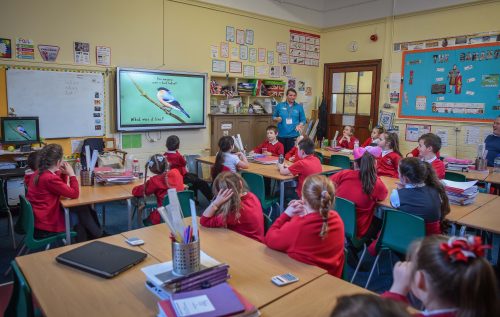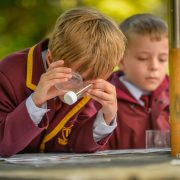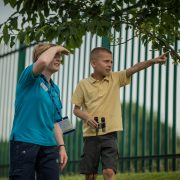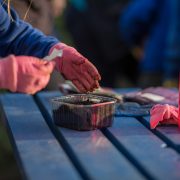Category: Curriculum
As we begin our own road to recovery, we are working with education experts to ensure we can also support recovery in our schools.
Our Curriculum Advisory Panel work with us to ensure our programmes for schools meet the needs of the education sector. This week we met to discuss the role of Chester Zoo in supporting teachers and pupils in the post COVID-19 world.
Once a term we come together with experts from across the education sector to discuss how our plans for working with schools will meet their needs. Our expert panel come from across EYFS, primary, secondary and FE colleges, and cover a range of areas of expertise between them including school leadership, animal management, biology, geography, psychology, school improvement, exam and text book writing, research and so much more. As a panel they enable us to stay up to date with what is happening across the education sector in England and Wales, and ensure that our programmes deliver on both the zoo’s conservation mission and the needs of the curriculum and exam specifications in schools and colleges.
There is no doubt that even as schools return to teaching in classrooms, things will be different for some time. Our normal engagement with them through school trips or outreach may be difficult to deliver due to social distancing measures and restrictions still in place. But as our panel confirmed, our role in supporting schools is more important now than ever. As children and teachers return to the classroom, the focus on mental health and wellbeing will need to be greater than ever before. Research tells us that fostering a connection to nature can support our own wellbeing, so we know we need to ensure we find new ways to deliver this with our schools. Resources for learning, like those we can provide at the zoo, that focus on empathy for others, for animals and for the environment could also play an important role.
We talked together about the recovery curriculum and the importance of inspiring pupils who may have disengaged during long absences from school life. Again there is certainly a role for the zoo here. Our 35,000 animals and plants all have a story to tell, one that is capable of inspiring and motivating some of the most disengaged learners. Our projects and programmes have often had the most impact on those pupils that might struggle more with traditional teaching and curriculum. The types of experiences and connection a conservation or zoo inspired programme can deliver may also be helpful in aiding transition to high school, especially when so many primary pupils will have had positive experiences with the zoo in one form or another.
“The zoo plays such an important role in educating young people about the many threats that wildlife face and what we can all do to mitigate those threats. As a panel we are proud to support the inspirational Conservation Education team in ensuring that what they do meets the needs of schools and colleges, both practically and in terms of curriculum.
Bringing together the expertise of the zoo’s specialist team with the broad education sectoral expertise of the panel, enables us to help shape a service that is both innovative and relevant.”
Nicola Hawley, Chair of the Curriculum Advisory Panel
Education is a huge part of how we achieve our mission of preventing extinction. Through inspiring the next generation of conservationists, connecting children with nature and supporting young people to take action for wildlife now, we can mitigate some of the threats to the animal and plant species we care about. In the last few months, even with our schools closed, our online resources and virtual zoo days have provided lots of opportunities for this to happen. We know they have been used effectively by thousands of schools and families home schooling. Following the valuable guidance of our expert panel, we will be working on new ways to achieve our mission in the current circumstances, knowing that we will not only be supporting our own educational objectives but supporting the recovery of schools too.
On the same day we met, we also had news that the zoo will be able to reopen in the near future. Whilst this gives us some hope, we still have a long road ahead of us. But thanks to our panel we know we’re on the right path and we’ll continue to find new ways to ensure we can connect teachers and pupils with wildlife, to support them to deliver their curriculum and to engage learners with the wonders of the natural world.
Our education programmes are an important part of our mission of preventing extinction. They inspire people to care about and, more importantly, take action for the natural world. We deliver a lot of our education activities with people when they visit the zoo, but we know not everyone is able to come to us.
To achieve our conservation mission, it’s important that we reach as many people as possible. So, in 2009, we took the zoo on the road and launched our free Safari Ranger outreach service, taking zoo education workshops out to schools and community groups in our local area.
We started with one Safari Ranger and a handful of workshops for primary school aged children. Over the last decade, our offer and team has grown hugely. We now work across the North West of England and into North Wales. In 2019, we delivered a huge 2,500 workshops engaging almost 80,000 participants ranging from early years groups through to university aged students, and everything in between.

Whilst Safari Ranger workshops can be booked by any school within a 60 minute drive of the zoo, we have particularly focused our projects on those schools who might face additional barriers to visiting. We aim to work with schools who have had limited previous engagement with the zoo and who have high numbers of pupils eligible for free school meals. Projects are linked to one of our main conservation campaigns and aim to empower pupils to act for wildlife, as well as generating learning across the curriculum.
Since the pilot phase, 100s of schools have been involved in taking action for our Sing for Songbirds campaign, our Sustainable Palm Oil Challenge and more recently our Wildlife Connections campaign which focuses on the threats facing UK Wildlife. Each project involves multiple visits from our team to the school and a trip to the zoo. In some cases, families from those schools are also supported to visit the zoo with free tickets and resources linked to their children’s learning.
We’ve been absolutely BLOWN AWAY by all the amazing work that you’ve all been doing whilst watching our Virtual Zoo Days over the last few weeks.
Whether you’ve been creating your own zoos, colouring in our animal masks, or making your own fact files – it’s all fantastic learning and we’ve really enjoyed seeing what you’ve been getting up to.



